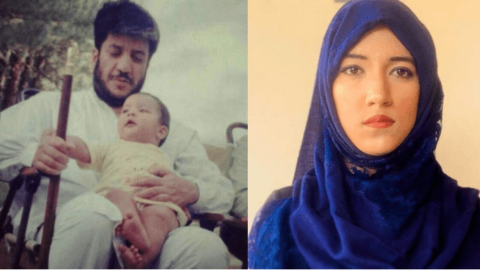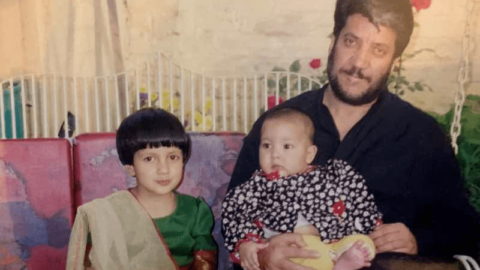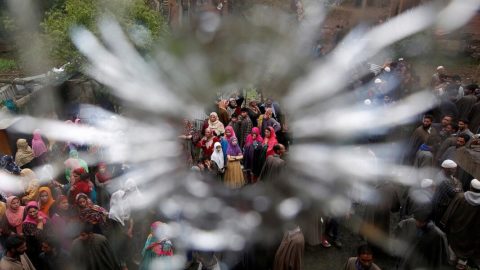By Tazeen Hasan Shah, also called the “Nelson Mandela of Kashmir”, is detained for 34…

Harassing Family Members of Detained Kashmiri Politicians
By Tazeen Hasan
The Indian government’s indictment of Shabir Shah’s wife in an alleged 2005 “money laundering” case is a shameful maneuvering of the justice system.
According to Indian national and Kashmiri media reports, the court has granted bail to Bilquis Shah, wife of Shabir Shah, one of the most revered Kashmiri politicians in Indian-administered Kashmir.
Shabir Shah was nominated as the vice president of the Hurriyat Conference, an amalgam of Kashmiri liberation organizations striving for the right of self-determination for the Indigenous population of Kashmir.
In September 2020, the prosecution indicted Bilquis Shah in an alleged “money laundering” case occurring in 2005. Bilquis is a respectable medical doctor and serves as an administrator at the local hospital in Kashmir.
She is also the sole breadwinner of the family and is bringing up her two daughters as a single mother during the prolonged detentions of Shabir Shah.
Imprisoned since 2017, Shabir Shah, 67, is facing the fifth year of his pretrial detention for an alleged crime committed in 2005. In 2019, they summoned his daughter to court, who was just five years old at the time of the alleged offence. In 2020, they framed his wife too.
Every time a bail plea is filed, the prosecution insists they need more time to collect evidence against Shah. It is also noteworthy that since the alleged crime was committed in 2005, the prosecution has failed to gather evidence against Shah in the last 16 years.
The same is true for 40 other Kashmiri leaders languishing in the worst conditions in jails outside Kashmir, without trial. Most of them are detained under the notorious and controversial Public Safety Act (PSA), which requires no judicial due process. The Indian supreme court have called it (Lawless Laws), but Jammu and Kashmir Police continue to detain political, intellectual, and civil leadership under this law.
A.S. Dulat, the former chief of the Research and Analysis Wing (RAW), wrote in his 2015-book Kashmir: “ In the Vajpayee years, immediately after the release of Kashmiri leaders booked under the PSA, they were arrested again outside the prison gates. This is enough evidence indicating that in order to colonize Kashmir, India is using arbitrary detention as a tool”.
Indian government officials are never tired of blaming cross-border infiltration for the unrest in Kashmir. Yet, they crush every expression of peaceful political grievance. Furthermore, they use shameful and heinous tactics to harass and intimidate the families.
Lately, they have begun to use another controversial law to detain civil leadership called the Unlawful Prevention Act (UAPA), which vaguely defines unlawful activities. Anything from social media posts and stone-pelting, to a private conversation and publishing an article, may be considered an illegal activity.
Prolonged Pretrial detention is considered arbitrary according to international human rights law and fair trial standards.
The Indian government uses arbitrary detention to subjugate Kashmiri political leadership and pressure them to relinquish the right of self-determination for the Kashmiri people. Now it is targeting and harassing the families to achieve their colonizing goals.
In 2019, they summoned his daughter to court, who was just five years old at the time of the alleged crime. In 2020, they framed his wife too. This disgraceful legal maneuvering is enough evidence of the exploitation and harassment of the family as a pressure tactic.
Shabir and Bilquis’ daughter Sama Shah, being a top high school student in Kashmir in 2018, was studying in London at the time of the court summoning.
These are heinous gimmicks employed by the colonizers to shut up the dissenting voice of the people of Kashmir.
There is strong evidence that the charges against Shah are trumped up and political.
The fabricated and trumped-up charges against Kashmir’s political leadership are not new. They have been facing arrests and detentions in the past under laws that do not require any due process.
The prosecution claimed they found 6.2 million Indian Rupees in possession of alleged “hawala dealer” Aslam Wani. Wani initially pleaded not guilty, yet later, he stated that he was a hawala agent and that the money had to be transferred to Shabir Shah. The prosecution claims that Wani delivered 22.5 million Indian rupees to Shah.
Notably, the court granted bail to the alleged primary accused in Wani’s case, however, Shah’s bail plea was dismissed several times. This seems to be a critical legal contradiction and shows the arbitrariness of the case.
The case is also mired with other inconsistencies, as the prosecution could not collect and provide enough evidence, even after 14 years, to solve the unfounded “money laundering” and “terror funding” case against Shabir Shah.
The prosecution persuaded the court to extend the pretrial custody of Shabir Shah, because the charges against him are serious, and the prosecution needs more time to collect evidence.
While rejecting the bail plea, the judge said that the prosecution could not be blamed for the delay on account of the COVID-19 pandemic, stating ‘Ultra posse Nemo obligatur’ (No one is obligated beyond what he is able to do).
In 2020, the Enforcement Directorate also produced a charge sheet against Bilquis Shah, claiming she received part of funds delivered by Wani.
They also probed Bilquis about her house and claimed that she used the money to construct the house. Bilquis responded that she inherited the plot from her parents and took a 20 lac loan from the bank to build the house.
Though her bail provides a little comfort to the family, the case proceedings, hearings, and visits to Shabir Shah in Tihar Jail, Delhi, pose immense distress for Bilquis and her daughter Seher Shah, a student herself.
According to Seher, jail staff keep a hostile attitude on their visits. The family faces humiliating frisking.
A 2019 UN report also confirmed that prisons outside the state are hostile for Kashmiri Muslim detainees, especially separatist leaders. Transferring Kashmiri detainees outside the state makes it harder for family members and legal counsels to meet with them.
One former Kashmiri prisoner of Tihar jail reported that jail doctors and medical staff attitudes towards Kashmiri prisoners are worse than the attitudes of guards.
In 2010, Indian authorities in Kashmir admitted to Amnesty staff that they have to keep some people “out of circulation.” Amnesty International’s 2011 report on Lawless Laws says Shabir Shah is out of circulation. Even at the end of 2021, Shah is still out of circulation.
Ironically, the Indian government has now decided to keep Kashmiri leadership out of circulation through emergency laws or trumped-up charges.
There are many question marks. Are these shameful legal maneuverings are helping India maintain the colonization of Kashmir?




